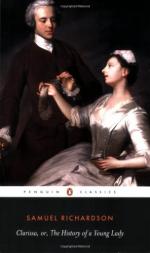And, in truth, never were affability and complacency (graciousness, some have called it) more eminent in any person, man or woman, than in her, to those who put it in her power to oblige them: insomuch that the benefitted has sometimes not known which to prefer—the grace bestowed, or the manner in which it was conferred.
It has been observed, that what was said of Henry IV. of France, might be said of her manner of refusing a request: That she generally sent from her presence the person refused nearly as well satisfied as if she had granted it.
Then she had such a sacred regard to truth.—You cannot, Sir, expatiate too much upon this topic. I dare say, that in all her letters, in all the letters of the wretch, her veracity will not once be found impeachable, although her calamities were so heavy, the horrid man’s wiles so subtle, and her struggles to free herself from them so active.
Her charity was so great, that she always chose to defend or acquit where the fault was not so flagrant that it became a piece of justice to condemn it; and was always an advocate for an absent person, whose discretion was called in question, without having given manifest proofs of indiscretion.
Once I remember, in a large circle of ladies, every one of which [I among the rest] having censured a generally-reported indiscretion in a young lady—Come, my Miss Howe, said she, [for we had agreed to take each other to task when either thought the other gave occasion for it; and when by blaming each other we intended a general reprehension, which, as she used to say, it would appear arrogant or assuming to level more properly,] let me be Miss Fanny Darlington. Then removing out of the circle, and standing up, Here I stand, unworthy of a seat with the rest of the company, till I have cleared myself. And now, suppose me to be her, let me hear you charge, and do you hear what the poor culprit can say to it in her own defence. And then answering the conjectural and unproved circumstances, by circumstances as fairly to be supposed favourable, she brought off triumphantly the censured lady; and so much to every one’s satisfaction, that she was led to her chair, and voted a double rank in the circle, as the reinstated Miss Fanny Darlington, and as Miss Clarissa Harlowe.
Very few persons, she used to say, would be condemned, or even accused, in the circles of ladies, were they present; it is generous, therefore, nay, it is but just, said she, to take the part of the absent, if not flagrantly culpable.
But though wisdom was her birthright, as I may say, yet she had not lived years enow to pretend to so much experience as to exempt her from the necessity of sometimes altering her opinion both of persons and things; but, when she found herself obliged to do this, she took care that the particular instance of mistaken worthiness in the person should not narrow or contract her almost universal charity into general doubt or jealousy. An instance of what I mean occurs to my memory.




